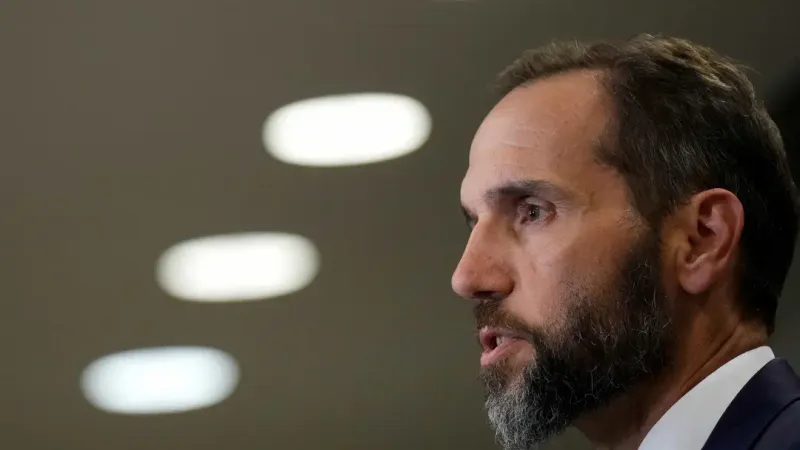Israeli Defense Minister Unveils Unofficial Plan for Gaza's Postwar Governance
Israeli Defense Minister Yoav Gallant proposed Thursday that Israel could have security control over Gaza after the war, but its civil administration would be run by local Palestinians, and no settlements would be established. The plan — which has yet to be submitted to other ministers — runs...
Facts
- Israeli Defense Minister Yoav Gallant proposed Thursday that Israel could have security control over Gaza after the war, but its civil administration would be run by local Palestinians, and no settlements would be established. The plan — which has yet to be submitted to other ministers — runs against the Biden administration's stated goal of giving the Palestinian Authority, which governs parts of the West Bank, control of the strip's civil affairs after the war.1
- Gallant also posited that a multi-national force would take charge of rebuilding the territory, and the Israeli military would continue its military operations, particularly in the south of the strip and with more targeted operations at a lower intensity. The plan was not discussed in any detail in the cabinet meeting and Israeli Prime Minister Benjamin Netanyahu hasn't publicly commented on it.2
- Ministers on Thursday exchanged barbs during the security cabinet meeting over a possible internal probe into the military's failures during Hamas' Oct. 7 attack. Elements of Netanyahu's government argued with military Chief of Staff Herzi Halevi, especially over the possibility of former Defense Minister Shaul Mofaz — who held a top military role during Israel's 2005 disengagement from the strip — being part of the investigation committee.3
- Meanwhile, tensions in the broader region escalated this week following the killing of the Deputy Head of Hamas' Political Bureau, Saleh al-Arouri, in Beirut; US airstrikes that killed a senior commander of an Iran-backed militia in Baghdad; and continued attacks by Yemen's Houthis in the Red Sea. US Secretary of State Antony Blinken is expected to travel to Israel, the West Bank, Egypt, Qatar, Turkey, Greece, Jordan, the UAE, and Saudi Arabia.4
- Hezbollah Secretary-General Hassan Nasrallah said Friday that a response to Israel's killing of Arouri was 'inevitable,' adding that all of Lebanon would be 'exposed' if Hezbollah didn't respond. He also said Hezbollah’s current operations against Israel on the border had opened a 'historic opportunity' for Lebanon to liberate land [referring to the Shebaa Farms and town of Ghajar].5
- Gaza's health ministry reports that the conflict has killed 22.4K people in the Gaza Strip, the majority of whom were women and children. The official Israeli death toll on Oct. 7 stands at around 1.2K people, with over 100 hostages still being held in the Gaza Strip.6
Sources: 1Guardian, 2BBC News, 3REUTERS, 4USA Today, 5France 24 and 6Associated Press.
Narratives
- Pro-establishment narrative, as provided by POLITICO. The US is doing everything it can to both ensure that Israel can eliminate Hamas' military capabilities and prevent regional escalation. Israel must be able to defend itself from terrorist attacks, whether from Gaza or elsewhere, and is taking the right steps to wind down its military operations in Gaza, as it is not in the US or Israel's best interest to see the conflict escalate. Nevertheless, the US is prepared to defend its allies in the region and deter threats to regional and global security.
- Pro-Israel narrative, as provided by Jerusalem Post. Though this has been a tragic war, Israel must root out Hamas' leadership and restore deterrence with Iran and its proxy, Hezbollah. Hezbollah is a terrorist army with far greater military capabilities than Hamas, and Israel cannot allow its citizens residing in the north to live under the constant threat of terrorist attacks. The UN resolution that ended the 2006 war with Hezbollah has failed to ensure Israel's security, and if some sort of new arrangement is not made, Israel will be forced to intervene. Likewise, in Gaza, Hamas' military capabilities must be eliminated to ensure Israel's security.
- Pro-Palestine narrative, as provided by Middle East Eye. Israel continues to demonstrate that its war isn't against Hamas or Hezbollah but against the Palestinian and Lebanese people as a whole. Nowhere in Gaza is safe, and Israel has effectively rendered the north of the strip unlivable as it kills Palestinians at an unprecedented rate. Though the US, Israel's biggest ally, wants to minimize the war's intensity, it must instead exert more pressure to end the war completely.
- Narrative D, as provided by Al Mayadeen. Hezbollah will deal with Israel's belligerent and aggressive behavior at a time it deems most advantageous, as the Lebanese resistance doesn't just react to security incidents but makes painstaking calculations to both deter Israel from violating Lebanon's sovereignty and avoid an unnecessary and destructive conflict. Israel, backed by the US, is committing atrocious crimes in Gaza to which Hezbollah has been forced to respond. Israel's leadership should keep in mind that Hezbollah is more than ready for an all-out war and can inflict serious losses.







